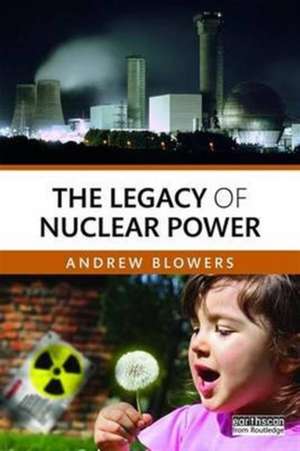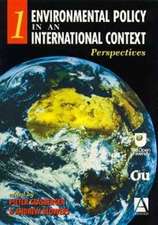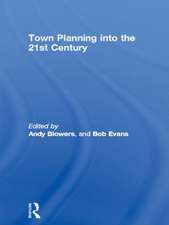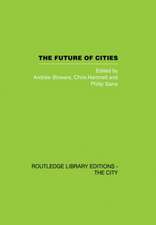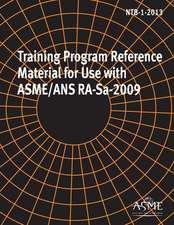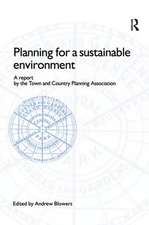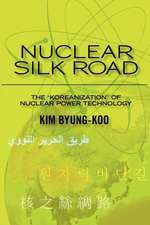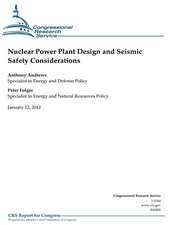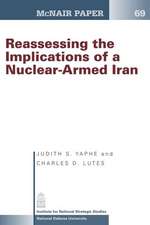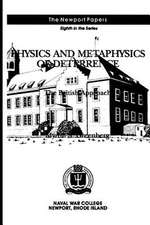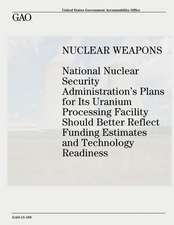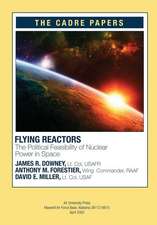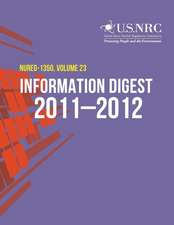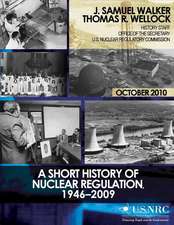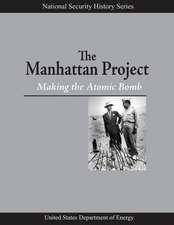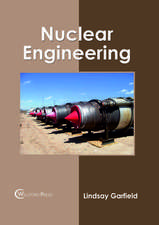The Legacy of Nuclear Power
Autor Andrew Blowersen Limba Engleză Paperback – 5 sep 2016
The Legacy of Nuclear Power takes a historical and geographical perspective going back to the origins of these places and the ever changing relationship between local communities and the nuclear industry. The case studies are based on a variety of academic and policy sources and on conversations with a vast array of people over many years. Each story is mediated through an original theoretical framework focused on the concept of ‘peripheral communities’ developing through changing discourses of nuclear energy. This interdisciplinary book brings together social, political and ethical themes to produce a work that tells not just a story but also provides profound insights into how the nuclear legacy should be managed in the future.
The book is designed to be enjoyed by academics, policy-makers and professionals interested in energy, environmental planning and politics and by a wider group of stakeholders and the public concerned about our nuclear legacy.
| Toate formatele și edițiile | Preț | Express |
|---|---|---|
| Paperback (1) | 479.96 lei 6-8 săpt. | |
| Taylor & Francis – 5 sep 2016 | 479.96 lei 6-8 săpt. | |
| Hardback (1) | 1280.44 lei 6-8 săpt. | |
| Taylor & Francis – 5 sep 2016 | 1280.44 lei 6-8 săpt. |
Preț: 479.96 lei
Nou
Puncte Express: 720
Preț estimativ în valută:
91.84€ • 95.89$ • 76.01£
91.84€ • 95.89$ • 76.01£
Carte tipărită la comandă
Livrare economică 04-18 aprilie
Preluare comenzi: 021 569.72.76
Specificații
ISBN-13: 9780415869997
ISBN-10: 0415869994
Pagini: 278
Ilustrații: 117
Dimensiuni: 156 x 234 x 19 mm
Greutate: 0.39 kg
Ediția:1
Editura: Taylor & Francis
Colecția Routledge
Locul publicării:Oxford, United Kingdom
ISBN-10: 0415869994
Pagini: 278
Ilustrații: 117
Dimensiuni: 156 x 234 x 19 mm
Greutate: 0.39 kg
Ediția:1
Editura: Taylor & Francis
Colecția Routledge
Locul publicării:Oxford, United Kingdom
Public țintă
PostgraduateCuprins
- Nuclear oases – the persistence of the periphery
- Hanford, USA – an enduring legacy
- Sellafield, UK – a paradox of power
- La Hague and Bure, France – the traditional and the modern
- Gorleben, Germany – the power of resistance
- Conclusion
Recenzii
"Andy Blowers uses his long experience in public, investigative and academic life to produce a masterpiece addressing the hazards from nuclear waste, using as examples Hanford (Washington State, US), Sellafield (UK), the Cotentin Peninsula in Normandy, and Gorleben in Germany, all of which he visited to study responses from local communities. He also summarises progress with long-term management of SNF in other countries including Russia, China, South-east Asia and Europe. These examples show the relevance of Blowers’ work, and ‘The Legacy’ is a riveting read. Its sub-plot is the sociological consequences of a new ‘industrial power’ (nuclear technology) on geographically remote communities; but his main conclusions – are thoughtful, informed and highly pertinent."- Frank Boulton, May 2017
"Blowers’ historical description and analysis is very comprehensive. Often I was thinking “but here he misses...” only to find the next paragraph exactly addressing that issue"-Jan Haverkamp, Nuclear Monitor, 10th May, 2017, No 843
"The nuclear industry invites us, all the time, to look forward – never to look back. Andy Blowers’ compelling study shows why: its legacy, all around the world, is a shocking one, with no long-term solutions to the problem of nuclear waste in sight, and countless communities blighted, in one way or another, by the nuclear incubus in their midst." – Jonathon Porritt, Founder and Director of Forum for the Future, UK
"The carefully distilled fruits of a long career researching social circumstances of communities around "nuclear oases" worldwide, this book is topical, readable, authoritative – and sometimes deeply moving. The message is of crucial political importance in all countries where these challenges persist." – Andy Stirling, the Science Policy Research Unit at the University of Sussex, UK
"Where should nuclear waste go? This carefully researched book explores the political and ethical issues by identifying key characteristics for sites that have been selected or proposed. They have almost all been in peripheral, often economically weak areas, usually with existing nuclear projects, where local resistance and opposition was unlikely or muted. A grim legacy." – David Elliott, Emeritus Professor of Technology Policy, the Open University, UK
"I offer a hearty ‘thank you’ to Andrew Blowers for providing the finest single volume on nuclear power I have encountered in my half century of energy research. Certainly among the most informed and dedicated contributors to the national discourse on energy policy, Blowers’ seminal publication is a masterwork built atop a contemplative foundation of interdisciplinary reading, innumerable interviews and active international fieldwork. On a topic often thickened by large dollops of incomprehensible gibberish, Blowers’ clear and expressive writing is a pleasure to read. This, his newest book, provides us with a clear-eyed look inside the periphery of the most controversial source of electricity in the world. All those considering the path we should take toward the energy future our descendants will inherit need first to absorb what Andrew Blowers has to say." – Martin J. Pasqualetti, Co-Director, Energy Policy Innovation Council, Professor of Geographical Sciences and Urban Planning, Arizona State University, USA.
"Andrew Blowers has been involved in this subject since the early 1980s when, as a local councillor in England, he was confronted by an industry attempting to dispose of radioactive waste on his doorstep. This is not a dry academic treatise. Through numerous meetings with others affected by the industry’s vain attempts to solve its intractable disposal problem he has been able to empathetically document grassroots community responses to this issue." – Pete Roche, Editor of no2nuclearpower.org.uk
"40 years ago, Brian Flowers in his seminal report for the Royal Commission on Environmental Pollution identified the lack of proven solutions to radioactive waste disposal as the Achilles Heel of the nuclear industry. Andrew Blowers’ perceptive and well-written account of attempts at sites in four key countries, UK, USA, France and Germany clearly demonstrates why it is proving so difficult to overcome this issue. It should be essential reading for anyone with an interest in this issue." - Stephen Thomas, Emeritus Professor of Energy Policy, University of Greenwich, UK
"Andy Blowers gives us an expertly researched and insightfully written book that explores the interplay of pivotal social, political, and economic relationships functioning inside four nuclear communities facing the multi-generational management and clean-up of radioactive waste. A must read book, not only for the public but also decision makers facing radioactive waste issues." – Roy Gephart, Former Chief Environmental Scientist from the Pacific Northwest National Laboratory, Washington State, USA
"Both an incisive and searing indictment of the short-sightedness of the nuclear industry and a penetrating analysis of how the industry both generates and perpetuates peripheral communities, which shoulder enormous risks reprocessing and burying nuclear waste. Andrew Blowers writes with the full authority expected of a world leading nuclear expert of over 30 years standing. His work is burnished with a deep humanism that keeps one eye firmly on the stakeholders that are usually neglected by policy makers; the generations of the future." – David Humphreys, Professor of Environmental Policy, The Open University, UK
"Andy Blowers knows the communities around nuclear sites, across many countries, better than anyone. His book is utterly compelling, beautifully written and explains how a variety of consecutive discourses have influenced the evolution of these ‘peripheral’ communities, giving them the ambiguous status of being both marginal and dependent, but also endowed with political influence. In this process, he shows with great clarity and insight why it is so difficult to move forward with long-term solutions for the nuclear waste problem and why the waste is so unlikely to move from its current locations." – Gordon MacKerron, Former Chair of UK Committee on Radioactive Waste Management, UK
"The Legacy of Nuclear Power makes for a passionate, well argued, and articulate read on many of the social, economic, and political costs to nuclear power. It pushes the boundaries not only for forcing us to critically assess and perhaps rethink contemporary nuclear and energy policy, but also because it brings to the forefront disturbing questions related to social justice, equity, and the environment. Important reading for anybody seriously interested in the nuclear renaissance." – Benjamin K. Sovacool, author of ‘The National Politics of Nuclear Power’, Aarhus University, Denmark
"The book tells a fascinating yet disconcerting backstory of the "participatory turn" in radioactive waste management. Through his in-depth four-country comparison, Blowers provides a compelling analysis of the power play behind the systematic tendency of peripheral communities ending up as the preferred hosts for nuclear waste disposal sites. Armed with his unique first-hand experience as activist, researcher, policy advisor, and policymaker, Blowers invites the reader to the backstage of policymaking on "the waste problem" – the enduring the Achilles’ heel of the global nuclear industry." – Markku Lehtonen, Research Fellow, Ecole des Hautes Etudes en Sciences Sociale, France
"Andrew Blowers offers an excellent insight into the geography of nuclear activities, describing how global nuclear dangers are connected to local sites where ordinary people live their everyday lives. There is a lot to be learned from this detailed and engaging story of nuclear sites in four separate countries." – Göran Sundqvist, Professor of Science and Technology Studies, University of Gothenburg, Sweden
"This book makes a great case for remote and culturally distinct communities, such as my home region Wendland. I could not agree more with Blowers’ analysis of the Gorleben protests claiming their success was due to them being "at once both flexible and obstinate, resisting change while also ultimately embracing it." In contributing to the development of a responsible and secure management concept for nuclear waste, this small protest community made big achievements in dealing with the nuclear legacy of our society - over decades, to this day. This is indeed zeitgeist and provides clear evidence for the principle which should be applied here: care before rush." – Rebecca Harms, President of the Greens/EFA European Parliament, Germany
"Blowers’ historical description and analysis is very comprehensive. Often I was thinking “but here he misses...” only to find the next paragraph exactly addressing that issue"-Jan Haverkamp, Nuclear Monitor, 10th May, 2017, No 843
"The nuclear industry invites us, all the time, to look forward – never to look back. Andy Blowers’ compelling study shows why: its legacy, all around the world, is a shocking one, with no long-term solutions to the problem of nuclear waste in sight, and countless communities blighted, in one way or another, by the nuclear incubus in their midst." – Jonathon Porritt, Founder and Director of Forum for the Future, UK
"The carefully distilled fruits of a long career researching social circumstances of communities around "nuclear oases" worldwide, this book is topical, readable, authoritative – and sometimes deeply moving. The message is of crucial political importance in all countries where these challenges persist." – Andy Stirling, the Science Policy Research Unit at the University of Sussex, UK
"Where should nuclear waste go? This carefully researched book explores the political and ethical issues by identifying key characteristics for sites that have been selected or proposed. They have almost all been in peripheral, often economically weak areas, usually with existing nuclear projects, where local resistance and opposition was unlikely or muted. A grim legacy." – David Elliott, Emeritus Professor of Technology Policy, the Open University, UK
"I offer a hearty ‘thank you’ to Andrew Blowers for providing the finest single volume on nuclear power I have encountered in my half century of energy research. Certainly among the most informed and dedicated contributors to the national discourse on energy policy, Blowers’ seminal publication is a masterwork built atop a contemplative foundation of interdisciplinary reading, innumerable interviews and active international fieldwork. On a topic often thickened by large dollops of incomprehensible gibberish, Blowers’ clear and expressive writing is a pleasure to read. This, his newest book, provides us with a clear-eyed look inside the periphery of the most controversial source of electricity in the world. All those considering the path we should take toward the energy future our descendants will inherit need first to absorb what Andrew Blowers has to say." – Martin J. Pasqualetti, Co-Director, Energy Policy Innovation Council, Professor of Geographical Sciences and Urban Planning, Arizona State University, USA.
"Andrew Blowers has been involved in this subject since the early 1980s when, as a local councillor in England, he was confronted by an industry attempting to dispose of radioactive waste on his doorstep. This is not a dry academic treatise. Through numerous meetings with others affected by the industry’s vain attempts to solve its intractable disposal problem he has been able to empathetically document grassroots community responses to this issue." – Pete Roche, Editor of no2nuclearpower.org.uk
"40 years ago, Brian Flowers in his seminal report for the Royal Commission on Environmental Pollution identified the lack of proven solutions to radioactive waste disposal as the Achilles Heel of the nuclear industry. Andrew Blowers’ perceptive and well-written account of attempts at sites in four key countries, UK, USA, France and Germany clearly demonstrates why it is proving so difficult to overcome this issue. It should be essential reading for anyone with an interest in this issue." - Stephen Thomas, Emeritus Professor of Energy Policy, University of Greenwich, UK
"Andy Blowers gives us an expertly researched and insightfully written book that explores the interplay of pivotal social, political, and economic relationships functioning inside four nuclear communities facing the multi-generational management and clean-up of radioactive waste. A must read book, not only for the public but also decision makers facing radioactive waste issues." – Roy Gephart, Former Chief Environmental Scientist from the Pacific Northwest National Laboratory, Washington State, USA
"Both an incisive and searing indictment of the short-sightedness of the nuclear industry and a penetrating analysis of how the industry both generates and perpetuates peripheral communities, which shoulder enormous risks reprocessing and burying nuclear waste. Andrew Blowers writes with the full authority expected of a world leading nuclear expert of over 30 years standing. His work is burnished with a deep humanism that keeps one eye firmly on the stakeholders that are usually neglected by policy makers; the generations of the future." – David Humphreys, Professor of Environmental Policy, The Open University, UK
"Andy Blowers knows the communities around nuclear sites, across many countries, better than anyone. His book is utterly compelling, beautifully written and explains how a variety of consecutive discourses have influenced the evolution of these ‘peripheral’ communities, giving them the ambiguous status of being both marginal and dependent, but also endowed with political influence. In this process, he shows with great clarity and insight why it is so difficult to move forward with long-term solutions for the nuclear waste problem and why the waste is so unlikely to move from its current locations." – Gordon MacKerron, Former Chair of UK Committee on Radioactive Waste Management, UK
"The Legacy of Nuclear Power makes for a passionate, well argued, and articulate read on many of the social, economic, and political costs to nuclear power. It pushes the boundaries not only for forcing us to critically assess and perhaps rethink contemporary nuclear and energy policy, but also because it brings to the forefront disturbing questions related to social justice, equity, and the environment. Important reading for anybody seriously interested in the nuclear renaissance." – Benjamin K. Sovacool, author of ‘The National Politics of Nuclear Power’, Aarhus University, Denmark
"The book tells a fascinating yet disconcerting backstory of the "participatory turn" in radioactive waste management. Through his in-depth four-country comparison, Blowers provides a compelling analysis of the power play behind the systematic tendency of peripheral communities ending up as the preferred hosts for nuclear waste disposal sites. Armed with his unique first-hand experience as activist, researcher, policy advisor, and policymaker, Blowers invites the reader to the backstage of policymaking on "the waste problem" – the enduring the Achilles’ heel of the global nuclear industry." – Markku Lehtonen, Research Fellow, Ecole des Hautes Etudes en Sciences Sociale, France
"Andrew Blowers offers an excellent insight into the geography of nuclear activities, describing how global nuclear dangers are connected to local sites where ordinary people live their everyday lives. There is a lot to be learned from this detailed and engaging story of nuclear sites in four separate countries." – Göran Sundqvist, Professor of Science and Technology Studies, University of Gothenburg, Sweden
"This book makes a great case for remote and culturally distinct communities, such as my home region Wendland. I could not agree more with Blowers’ analysis of the Gorleben protests claiming their success was due to them being "at once both flexible and obstinate, resisting change while also ultimately embracing it." In contributing to the development of a responsible and secure management concept for nuclear waste, this small protest community made big achievements in dealing with the nuclear legacy of our society - over decades, to this day. This is indeed zeitgeist and provides clear evidence for the principle which should be applied here: care before rush." – Rebecca Harms, President of the Greens/EFA European Parliament, Germany
Descriere
The Legacy of Nuclear Power provides a historical and geographical perspective going back to the origins of these places and discusses the ever changing relationship between local communities and the nuclear industry. The case studies are based on academic and policy sources and on conversations with an array of people over many years. Each story is mediated through a theoretical framework focused on the concept of ‘peripheral communities’ developing through changing discourses of nuclear energy. This interdisciplinary book brings together social, political and ethical themes to produce a work provides profound insights into how the nuclear legacy should be managed.
